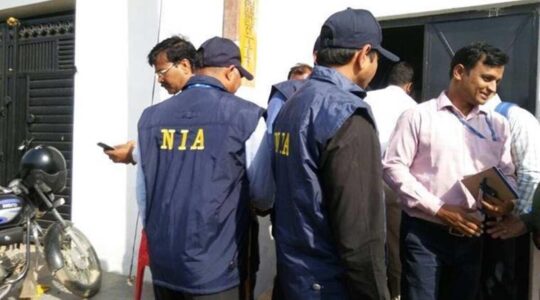
National Investigation Agency steps in again as the menace of radicalisation worsens in Tamil Nadu
A Tamil Nadu based organisation, the Manitha Neethi Pasarai has come under the scanner of the National Investigation Agency (NIA).
The action by the agency comes following the arrest of one Sadik Basha or Sathik Batcha and four of his associates in February.
According to the NIA all these persons are sympathisers of the Islamic State (ISIS) and were involved in various anti-national acts.
Investigations in the past have shown that several radical Muslim outfits had started spreading their tentacles across southern India. While the activities of these outfits were restricted only to Kerala, there was a decision later on to unify like-minded Muslims from Kerala, Tamil Nadu and Karnataka.
The PFI then was born in 2006 with the merger of NDF, Karnataka Forum for Dignity and the Manitha Neethi Pasarai in Tamil Nadu.
In a chargesheet filed by the NIA, it said that the conspirators who formed the terror group are ISIS cadres, Mehboob Pasha from Bengaluru and Khaja Moideen of Cuddalore.
The case was originally registered by the Bengaluru police. The case relates to Pasha, a resident of Bengaluru, who in association with Moideen and Sadiq Basha, formed a terror group for spreading the ideology and activities of the ISIS.
The threat of the ISIS has been looming large in the state and there are several pockets where the problem is severe. While looking into the Haja Fakkrudin case, it was found that he was radicalised by a Cuddalore based group.
Haja is not the only operative from Cuddalore to have joined the ISIS. A computer engineer was deported recently from Singapore. He said that it was he who had introduced Haja to this organisation, following which he was radicalised.
During the various searches, literature relating to the ISIS had been found. Speeches of the 20th century Islamist thinker Abul Ala Maududi have been found in the possession of several youth.
Further the police have also seized compact discs which had the speeches of radical elements such as Anwar Al Awlaki and Abdul Raheem Green.
In its 2016 chargesheet, the NIA speaks about the role of Mohammad Naseer, a computer engineer in his mid 20s. Naseer was heading to Libya from Sudan, but was apprehended and later deported to India.
He did his computer engineering from the MNM college in Chennai. It was at this time that he would visit a mosque at Chennai which was run by the Tamil Nadu Thowheed Jamath, non-political Islamic
Organisation that preaches a puritanical version of Islam.
This group was founded by P Jainul Abdeen in 2004, when he broke away from the Tamil Nadu Muslim Munnetra Kazhagam.
The role of the ISIS in Tamil Nadu was unraveled in a big way in 2014. In August 2014, the police arrested Abdul Rahman and Mohammad Rizwan from the Ramnathapuram district on the charge that they were distributing t-shirts with the ISIS emblem.
A photo showing 26 youth posing with the t-shirt in front of a Mosque at Thondi had surfaced on the social media. While the police were not able to find any direct link with the outfit, it however showed that the ISIS was gradually being received in the state.
Ismail in his confession had said that Ashiq had promised them help for their operation. The NIA says that Ismail had links with the ISIS.
The intention was to carry out a major operation on Ganesh Chaturthi. These developments are significant in the wake of the murders in Coimbatore. Munnani spokesperson C Sasikumar in 2016 and an atheist H Farook in 2017 were murdered by radical Islamic groups.
NIA officials tell OneIndia that the problem is a deep-rooted one. These persons are operating under the name of the Islamic State now. They are part of the same radical set up which has been propagating violent Islam.
These operatives have been trying to propagate radical and violent Islam iseveral places at Tamil Nadu. Coimbatore, Cuddalore and Chennai are some of their key areas of operation.
Source: One India





